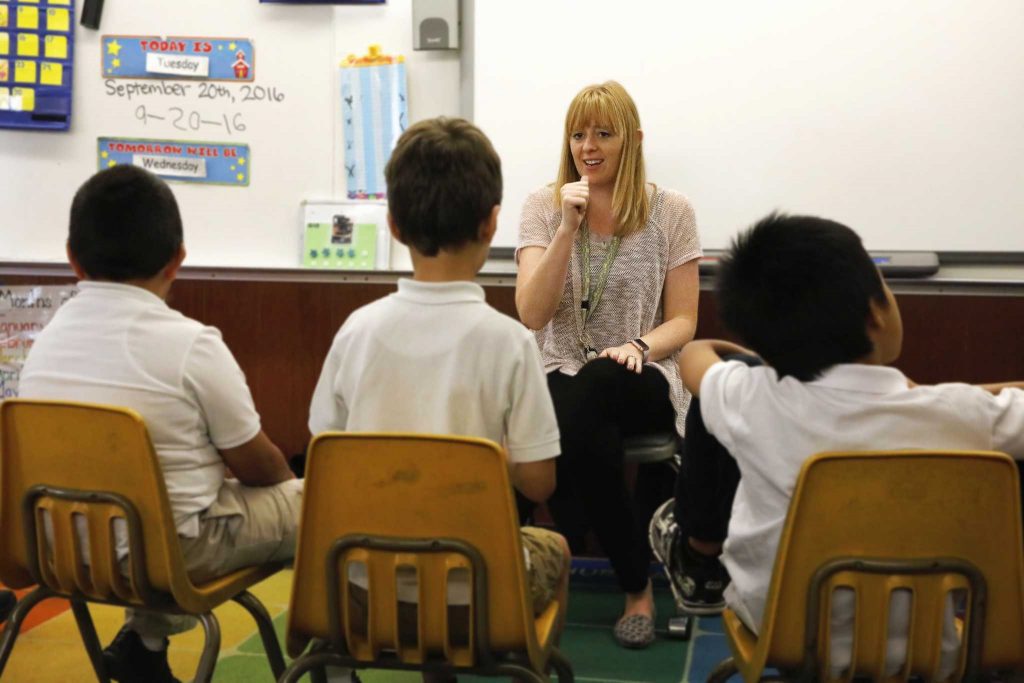This semester, the Department of Special Education started the third cycle of its deaf-blindness training program to prepare graduate students in their role as special education teachers.
In 2014, a U.S. Department of Education grant of $997,685 funded the innovative program run in collaboration with the California Deaf-Blind Services. Through this partnership, selected graduate students from the moderate/severe disabilities credential program acquire the knowledge and skills to improve the experience of children with deaf-blindness in the classroom.
“It takes a lot of work to get those children connected to what’s happening in the classroom and connected to the other children,” said Maurice Belote, CDBS Program Coordinator.
Belote said that for a child who is fully deaf, it doesn’t take much of vision impairment to greatly impact how they learn and communicate and vice versa.
Under federal law, deaf-blindness is the combination of hearing and vision impairment, whether completely deaf and blind or having some functional hearing and/or some functional sight.
“Deaf-blind children need people that are trained, and I think that it’s important that we are prepared,” said Thea Sigal, part of the third group of students in this program.
The specialization in deaf-blindness is a small field not only nationwide, but statewide, and the need for pioneers is increasing. A census conducted between 2010-2011 by the CDBS showed there were 978 deaf-blind children under the age of 21 in California, with the highest concentration in the city of Los Angeles, 167 and a total of 176 in the the Bay Area.
The number of deaf-blind children in California has increased since the census to about 1200, but there are only a few people trained with the skills and experience to attend to deaf-blind children’s needs in the classroom, according to Belote.
“On our grant, there are only four people for the whole state,” Belote said.
The four-year program began Oct. 1, 2014 and is designed to immerse a group of seven graduate students each year with children that are deaf-blind. During the program students attend seminars, where they meet with specialists and children who are deaf-blind and learn about their experience and progress.
“Because deaf-blindness is a complex disability, these children have a really complex set of needs and challenges,” Belote said.
After spending eight months visiting children with deaf-blindness at their schools and homes, where they observe specialists working with them, students interact with the children and study ways to improve the children’s learning and communicative skills in realistic scenarios.
“In the moderate/severe program you are learning about all of them (disabilities). This is more specific,” Kayla Kenton, a graduate of the program, said.
Kenton sometimes cares for children with deaf-blindness she met through the program and now works in a classroom with students with autism.
“I have been able to use everything I learned in this program because it puts learning in a total different perspective for you. The program made me such a stronger special ed teacher,” Kenton said.
Edith Arias, another graduate of the program, was paired with a seventh grade girl, whose vision declined since birth and with whom she worked to develop the skills taught in the program.
“Now I observe if they (children) are having problems hearing or seeing. The program opened up my mind about being creative on how to help students,” Arias said.
Because most of the graduates of the program remain in the area, it has a huge impact on the Bay Area, according to Belote.
The program’s final goal is that some, if not all, of these students will become experts in this field by assuming leadership roles and creating new program models that they can share with peers and by coaching or mentoring other teachers.
“We are hoping that the school districts will acknowledge that this person that’s working for them has lots of knowledge and experience and skills working with children that are deaf-blind so they can become kind of a local expert,” Belote said.








